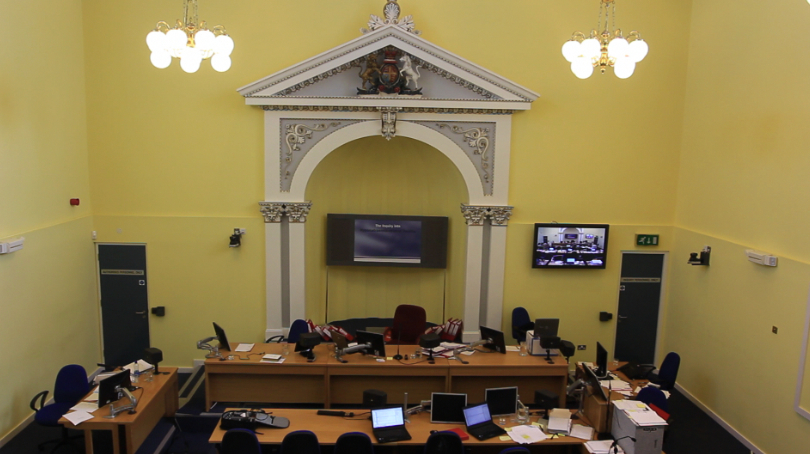By Niall McCracken
THE former Deputy Chief Medical Officer has been cautioned by the Chairman of the Hyponatraemia Inquiry for answering questions in a way which could be perceived as being unhelpful to the inquiry.
In August 2001 Dr Paul Darragh chaired a working group tasked with preparing guidelines on dilutional hyponatraemia, where too much of the wrong type of fluid leads to low sodium levels and potentially lethal brain swelling.
The inquiry has been exploring which of the child deaths in Northern Ireland caused by hyponatraemia in hospitals between 1995 and 2001 the various members of the working group were aware of; as parents of two children who died were not given the real cause until 2003 and 2005. A number of members of the groups have already told the inquiry that they were unaware of specific cases – although individual members had at least some experience of one or more cases.
During the hearing in at Banbridge courthouse yesterday (Wednesday 30 November), Dr Darragh was asked by counsel to the inquiry if he was surprised that doctors on the working group examining did not raise fluid deaths they had experience of when drawing up guidelines. In response Dr Darragh said- “I’m surprised by a lot of things”.
Reacting to Dr Darragh’s response the chairman of the inquiry, Mr Justice John O’Hara, said:
The Chairman: Excuse me, doctor. Saying, “I’m surprised by a lot of things”, is not a helpful answer to a question by Mr Stewart (junior counsel).
Dr Darragh: What answer would you like me to give?
The Chairman: I would like to hear you answer the question.
Dr Darragh: Well, the answer —
The Chairman: I have to tell you that that answer that you gave a moment ago seemed to me to be singularly inappropriate. When you were asked, “Are you surprised that they didn’t?”, and you answer, instead of saying, “Yes, I was surprised”, or, “No, I’m not surprised”, you say, “I’m surprised by a lot of things”. That strikes as somebody who’s not actually here to help the inquiry and I’m sure you are here to help the inquiry. So please don’t answer a question like that by saying, ‘I’m surprised by a lot of things’.
Dr Darragh: Chairman, I’m sorry if I’ve caused problems in the way I’ve responded.
The Chairman: Thank you.
Mr Stewart: Well, looking back now, are you disappointed that your fellow working group members didn’t share their knowledge with the rest of the group?
Dr Darragh: Yes.
The O’Hara Inquiry in Banbridge has established that within the eight-member group, there several individuals had varying levels of awareness that fluid had been issue in three specific deaths – Adam Strain in 1995, Lucy Crawford in 2000 and Raychel Ferguson in 2001.
However, previous evidence heard at the inquiry outlined that members of the working group did not raise deaths they had experience of when drawing up guidelines on preventing death and injury caused by hyponatraemia.
Dr Darragh was questioned on this point further at yesterday’s hearing:
Dr Darragh: I think we had a very knowledgable group assembled. They were giving us the benefit of their experience and knowledge —
The Chairman: No, they weren’t. They weren’t giving you the benefit of — on the evidence I have received, the members of that group were not giving you the benefit of their information and knowledge. Dr Taylor and Dr Crean knew about Adam’s death. Dr Taylor and Dr Crean knew about Claire’s death and Dr Taylor and Dr Crean knew about Lucy’s death. So you cannot say to me, I’m afraid, doctor, that the members of the working group gave you the benefit of their information and knowledge. In fact, it’s almost the opposite. On the version of events I’m being given, various people in that working group knew more than was shared with the working group So far from sharing, on one interpretation of events, they each withheld. Without any disrespect to the end product of the working group, that raises serious issues for me and for the families about what was not discussed or what was discussed and is not being admitted to at this inquiry. You could expect that the members of the working group would share the information and knowledge they had and that expectation would be entirely reasonable. But on the evidence which I have been given by each member of that working group who has come to the inquiry so far, they just didn’t do it, and I wonder why.
Dr Darragh: Well, in no way was I complicit with any attempt or did I have any knowledge of what you have listed today.
The Chairman: No, I’m saying to you that your expectation that the members of the working group would share information is entirely reasonable. In fact, that’s what you would want them to do and what you would expect them to do.
Dr Darragh: And I had no feeling at all that I was being in any way not provided with information.
The inquiry resumes again next week.
© The Detail 2013
 By
By
